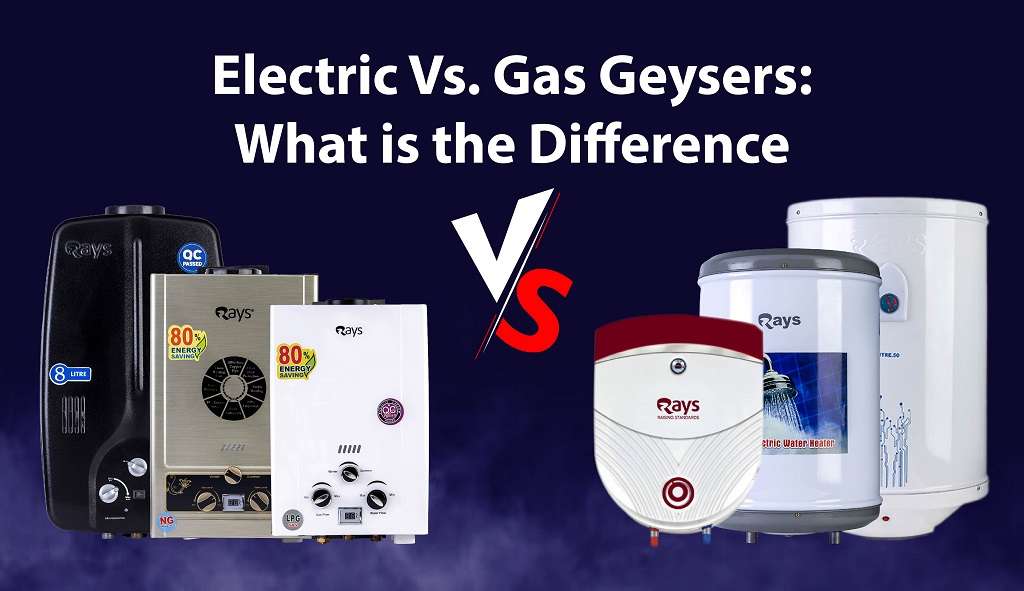Electric Vs. Gas Geysers – What is the Difference
We are all set to welcome winter. Not just focusing on dry fruits and warm clothes, we are thinking about the uninterrupted water supply. If your old geyser isn’t providing you enough hot water and you have enough hot water demand your tap only produces cold water when you turn it on, it is obvious that you require a new water heater. But what water heater or geyser should you buy?
Should you choose an electric or gas geyser? This is a question for every buyer to answer. Well, finding the correct water heater that matches your demands is more important because electric and gas have their fair share of advantages and disadvantages.
In this blog, we will discuss these two geysers in detail.
Gas Geyser
Gas Geysers are one common type of geyser, very popular among people. They are designed to use LPG, propane, or natural gas to heat water. This implies that in order to run a gas geyser, you either need a gas line or a gas cylinder.
One of the major benefits of gas geysers is their energy efficiency, as they only use gas when hot water is needed. This results in lower energy costs. These geysers are also small and space-efficient, making them perfect for houses with limited space. Gas geysers offer a cost-effective and practical hot water option for both residential and commercial settings because of their quick heating capabilities.
Gas geysers come in two following varieties.
Instant Gas Geysers
Instant or Tankless gas water heaters/geysers are super fast gas geysers and are considered an excellent investment. These gas geysers don’t have any storage space and work perfectly only on an instant heating system. Ideally, they are perfect for those people who don’t require a lot of water at once.
Storage Gas Geysers
Storage Gas Geysers are traditional geysers. They are ideal for large families, offices, and other commercial uses. Moreover, they come in different gauge thicknesses that help keep water warm for a longer period. They are compact and highly functional on extreme winter days. With easy and low maintenance quality.
Advantages
- You have total control over the amount and pace of heating when using a gas geyser.
- Both natural gas from pipelines and home gas cylinders or LPG can be used to power them.
- Suitable for big families.
- They are remarkably easy to maintain and fix.
- Since they don’t require power to operate, they may be used anywhere and at any time.
Flaws
- They have a shorter lifespan since some gas burners are more susceptible to damage.
- Not very secure since a gas leak may lead to disasters, and might result in carbon monoxide poisoning as well.
- Gas geysers are not environmentally friendly.
Electric Geyser
Electric water geysers are modern yet simplest-to-operate types of geysers. Most importantly, they are liked by the majority of people. The fundamental operating concept of automated electric water heaters hasn’t changed despite several technical improvements that have led to their adoption in a variety of homes. They are simply designed with copper heating components that utilize electricity to produce heat. Eventually, the water’s temperature rises. Electric geysers come in a variety of styles and are useful for smaller families.
Instant Electric Geyser
Electric Geysers that heat water rapidly allow you to take a shower fast. On those days when you are running late for school, work, or any other task, they are considered ideal. Mostly, they are seen in big cities where everyone is in a rush. Their smart design doesn’t let the water get very hot water because they lack a storage tank or water heater.
Electric Storage Geyser
Electric storage geysers are a great option for bigger households and commercial areas. Just like instant electric geysers, they warm the water with electrical rods but they aren’t instant and take a little time. However, they store water in large quantities.
Advantages
- The main advantage of an electric geyser is ease of use. You can have hot water with only the flick of a switch.
- They are easy to install and handle.
- Due to electricity, they can heat water quickly.
- They are usually safer because no direct fuel is involved.
- They have a long lifespan and are powerful.
Flaws
- Electric geysers need a constant source of power to run and they consume too much electricity. Using these geysers during a power outage is challenging.
- When compared to gas geysers, electric geysers are often more expensive to purchase, operate, and maintain.
Gas Vs. Electric Geysers
Now you have understood the basic difference and their functions thoroughly. In order to swiftly decide which geyser is ideal for your home, office, or workspace, let’s compare the two in-depth using the chart below. This chart will let you know what a gas geyser and an electric geyser are as well as their benefits and drawbacks.
| Scale | Electric Geyser | Gas Geyser |
| Price | Expensive than gas | Cheaper than gas |
| Heating Time | Quick heating | Slow heating |
| Safety Measures | Safe | Not much safe, can cause leaks |
| Space | Do not need many geysers | Need more space |
| Durability | Longer durability | Gas burner causes bigger damages |
| Installation | Easy installation process | Complex installation |
| Recommended | Urban homes and metropolitan cities | In northern areas, mountainous areas and large families |
If you have studied this blog, you ought to be able to decide whether a gas or electric geyser is best for your home, office, or commercial area. If you’re still unsure about the best geyser to purchase or whether you even require a new one. You may get suggestions from Electro Gallery on selecting between gas and electric geysers.
We carry the largest variety of gas and electric geysers to satisfy your needs this winter. Brands including Ariston, Canon, Corona, Nasgas, and Rays are offering all types of geysers at the best prices. They are energy efficient, versatile, and reliable enough to double the fun in winter.

